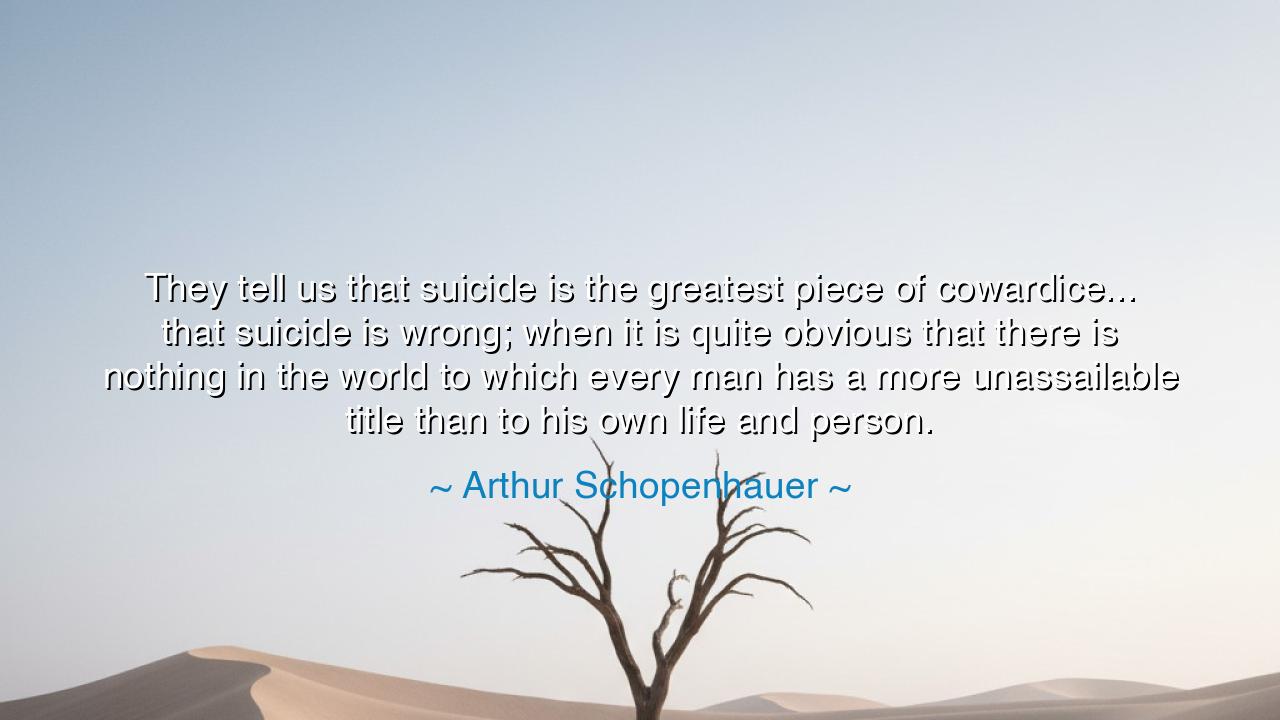
They tell us that suicide is the greatest piece of cowardice...
They tell us that suicide is the greatest piece of cowardice... that suicide is wrong; when it is quite obvious that there is nothing in the world to which every man has a more unassailable title than to his own life and person.






The philosopher Arthur Schopenhauer, a man who gazed unflinchingly into the abyss of human suffering, once declared: “They tell us that suicide is the greatest piece of cowardice… that suicide is wrong; when it is quite obvious that there is nothing in the world to which every man has a more unassailable title than to his own life and person.” These words are not a hymn to despair, but a profound meditation on freedom, suffering, and ownership of the self. Schopenhauer, often called the philosopher of pessimism, did not glorify death, but he challenged the moral dogmas that deny a person sovereignty over their own being. In a world where pain is often unavoidable and existence itself can feel burdensome, he dared to ask: who has the right to command us to endure?
To understand this quote is to confront the ancient question of autonomy — the power of man over his own soul. From the earliest days of philosophy, priests and kings alike claimed dominion over human life. Religion declared that life was sacred, the property of the gods; the state insisted it was the property of the ruler. Yet Schopenhauer, speaking in the spirit of the Stoics before him, proclaimed that life belongs to the one who bears it. Just as a man is master of his thoughts and his actions, so too must he be master of his beginning and his end. “Unassailable title” — those words are the heart of his meaning. No power, divine or earthly, can claim higher authority over the human soul than the person who inhabits it.
To the ancients, this would have been both shocking and familiar. The Stoic Seneca, writing under Nero’s tyranny, taught that death, when chosen in reason, was not cowardice but freedom. When the world no longer allowed a man to live in dignity, Seneca argued, the final act of autonomy — the choosing of one’s own death — was a return to self-possession. Like Schopenhauer, he believed that a man’s life is his own temple, and to guard its sanctity is his highest right. Yet both thinkers also warned that this power must be wielded not in haste or passion, but in clarity. To choose death out of bitterness is to surrender to pain; to choose it out of wisdom is to transcend it.
Still, Schopenhauer’s words should not be mistaken as a call to self-destruction. Rather, they reveal the depth of his compassion for human suffering. He looked upon the world and saw that pain was woven into the fabric of existence — hunger, loss, betrayal, illness, and the ceaseless striving of desire. And in that vision, he saw hypocrisy in those who condemned despair without easing it. “They tell us suicide is cowardice,” he writes, yet those who say so often live in comfort, untouched by the agonies that drive others to the edge. For Schopenhauer, it was not courage or cowardice that defined a man’s life, but understanding — the ability to see the truth of existence without flinching, and to bear it with dignity.
History offers many who understood this hard truth. Consider Yukio Mishima, the Japanese writer and samurai of the modern age. Mishima believed deeply in honor and the ownership of one’s destiny. When he felt that the soul of his nation had decayed beyond redemption, he chose to die by his own hand — not in despair, but as a final act of agency and protest. Whether one agrees with his choice or not, it is impossible to deny the fierce coherence of his philosophy: that a man’s life is his own to shape, his own to surrender, and that true ownership of the self includes the power to end one’s suffering with purpose. Schopenhauer would have understood him well.
Yet from this reflection arises a paradox that must be handled with reverence. If every person holds “unassailable title” to their own life, then the moral duty of others is not to condemn, but to nurture the conditions that make life bearable. To recognize someone’s right to despair does not mean abandoning them to it; it means meeting their suffering with understanding rather than judgment. The wise know that compassion, not condemnation, is the bridge between pain and peace. The lesson of Schopenhauer’s words is not that life should be cast away lightly, but that life’s worth cannot be dictated by another’s decree. Each person must find their own meaning, their own endurance, and their own peace — and others must honor that sacred individuality.
So, my listener, take this teaching not as a hymn to death, but as a call to reverence for human freedom. Recognize that each soul walks a path unseen, carrying burdens you may never comprehend. Do not hasten to call the broken cowardly, nor the suffering weak. Instead, offer presence, kindness, and understanding — the gifts that remind another of their power to live. And to yourself, remember always: though the world may not be yours to command, your life, your choices, and your soul are. Guard them as treasures no man or god can seize.
For as Schopenhauer teaches, to possess one’s own life fully is the first and last freedom. To live it wisely is courage; to end it in despair is tragedy; but to understand its sacred ownership — that is wisdom.






AAdministratorAdministrator
Welcome, honored guests. Please leave a comment, we will respond soon